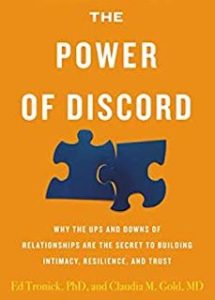
The famous, well-replicated “still-face experiment” involves an infant and parent seated facing each other. After a few minutes of play, the parent becomes completely unresponsive and shows a blank face. The infant tries an increasingly dramatic array of tricks to reanimate the parent while becoming more distressed. After a minute of participating in the experiment, the parent reengages, and parent and infant can synchronize once more. Not only did this experiment dramatically shift developmental psychologists’ understanding of infants’ agency in their social relationships, but also the research that built from this study over the last four decades offers insights into how each of us can build a strong sense of self and healthy relationships. In their new book, The Power of Discord: Why the Ups and Downs of Relationships are the Secret to Building Intimacy, Resilience, and Trust, Ed Tronick and Claudia M. Gold argue that discord in relationships is common and we build our sense of self, closeness with others, and ability to manage challenges when we embrace relationship mismatches, uncertainty, and the opportunity they present for growth. Tronick is the creator of the still-face experiment and University Distinguished Professor of Developmental and Brain Sciences at University of Massachusetts, Boston and Research Associate at Harvard Medical School. Gold is a pediatrician and author specializing in early childhood mental health and faculty at University of Massachusetts, Boston and at Boston Children’s Hospital. Although the still face experiment focuses on the infant-parent relationship, the paradigm and this book will be of interest to individuals seeking to improve a variety of different types of relationships as well as people who care for others who may have a history of unrepaired relationships.
People feel pressure to or expect to be in sync with relationship partners, but in reality, mismatch is the norm. The way that mismatch is repaired can nurture us and bring about a sense of pleasure, security, and trust. Parents and infants, for example, are out of sync about 70% of the time, but that mismatch is important for infants, and adults, to feel agentic, self-confident, and competent in managing challenges on independently and with the help of others. In this vein, Tronick and Gold echo previous calls that parents should trust their own instincts, remain calm and present, and be simply “good enough;” they should not strive for perfection, which undermines mental health and well-being.
We make meaning, in our bodies and minds, of moments of mismatch and repair with others and the interpretations we build of these experiences stay with us. Because of our parents’ roles in children’s early environment and meaning-making they act as “neuroarchitects,” changing how their children’s minds and brains are built and even how genes are expressed. When people cannot make coherent meaning of events or cannot construct a vision for a better future, it can threaten their sense of self, keep them stuck in a moment of hardship, and produce feelings of hopelessness. Even if an individual had insufficient experience with relational mismatch and repair in early life or experienced other early life stresses, they can learn to self-regulate as they co-regulate in the context of new relationships. Relationships are the best buffer against stress and trauma, way to heal from them, and the best booster of well-being generally.
To build productive interpretations of the messiness of relationships, people need to feel safe and accept that being out of sync is part of the process of connecting. Relationships are dynamic and each party has a responsibility in shaping the dynamic. Considering the other party’s perspective, remaining open and curious about the other person, listening to them and making them feel like they belong, being playful, and leaving room for uncertainty can support relationship health.
Although Tronick and Gold focus primarily on relationships between two individuals, principles from the still-face paradigm have implications for society more generally. Society needs to invest in social relationships, including but not limited to the parent-child relationship; our relationships are literally, biologically, life-sustaining. The differences between us can be our greatest strength if we allow ourselves to work through relational turbulence, accept that struggle is normal, and recover into better and stronger relationships. In this moment in time, with so much political divisiveness, and when we are quarantining at home and many of us are spending significant amounts of time with family, we could all benefit from heeding Tronick and Gold’s relationship advice.
Tronick, E. & Gold, C.M. (2020). The Power of Discord: Why the Ups and Downs of Relationships are the Secret to Building Intimacy, Resilience, and Trust. Hachette Book Group.





